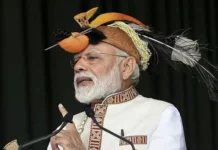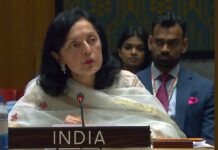 WASHINGTON: India will be the world’s fastest growing economy during the next five years, a top US intelligence think-tank has said while underlining that Pakistan, unable to match India’s economic prowess, will seek “other methods” to maintain even a semblance of balance.
WASHINGTON: India will be the world’s fastest growing economy during the next five years, a top US intelligence think-tank has said while underlining that Pakistan, unable to match India’s economic prowess, will seek “other methods” to maintain even a semblance of balance.
“Pakistan, unable to match India’s economic prowess, will seek other methods to maintain even a semblance of balance,” said the report ‘Global Trends’ of the National Intelligence Council (NIC), which is the center for mid-term and long-term strategic thinking within the US Intelligence Community.
“India will be the world’s fastest growing economy during the next five years as China’s economy cools and growth elsewhere sputters, but internal tensions over inequality and religion will complicate its expansion,” the report said.
In its report, the National Intelligence Council said that Pakistan will seek to maintain a diverse set of foreign partners, from which it can draw economic and security assistance, and to develop a credible nuclear deterrent by expanding its nuclear arsenal and delivery means, including “battlefield” nuclear weapons and sea-based options.
“In its efforts to curtail militancy, Islamabad will also face multiple internal security threats, as well as a gradual degradation of equipment used in these operations, declining financial resources, and a debate over changes needed to reduce the space for extremism,” it said.
“While violent extremism is unlikely to present an existential threat to Pakistan during this period, it will have negative implications for regional stability,” the report said.
Pakistan has introduced short-range, “battlefield” nuclear weapons that it has threatened to use against Indian conventional incursions, which lower the threshold for nuclear use, the report said.
NIC said India’s growing economic power and profile in the region will further complicate calculations, as New Delhi navigates relations with Beijing, Moscow, and Washington to protect its own expanding interests.
New Delhi, however, will continue to offer smaller South Asian countries a stake in India’s economic growth through development assistance and increased connectivity to India’s economy, contributing to India’s broader effort to assert its role as the predominant regional power, it added.
According to National Intelligence Council tremendous internal and external changes will shape security and political stability in South Asia in the next five years as the planned drawdown of international forces in Afghanistan; the deepening relationship between the US and India; China’s westward-facing development objectives under its One Belt, One Road initiative; and inroads by the Islamic State in Iraq and the Levant (ISIL) and other terrorist groups all have their impact.
South Asia also will face continuing challenges from political turmoil particularly Pakistan’s struggle to maintain stability as well as violent extremism, sectarian divisions, governance shortfalls, terrorism, identity politics, mounting environmental concerns, weak health systems, gender inequality, and demographic pressures, it said.
“Geopolitically, the region’s greatest hope is India’s ability to use its economic and human potential to drive regional trade and development. At the same time, Afghanistan’s uncertain prospects, extremism and violence in Pakistan, and the ever-present risk of war between India and Pakistan probably represent the greatest challenge to unlocking the region’s potential,” it said.
NIC said despite persistent problems like violent extremism and tension between its two nuclear powers, India and Pakistan, the region’s global relevance is changing, as Iran opens up economically after sanctions relief and China turns its focus westward.
“India is also an increasingly important factor in the region as geopolitical forces begin to reshape its importance to Asia, and the United States and India will grow closer than ever in their history,” it said.
New Delhi will be a victim of its own success as India’s growing prosperity complicates its environmental challenges.
For example, providing electricity to 300 million citizens who now lack it will substantially increase India’s carbon footprint and boost pollution if done with coal-or gas-fired plants, it warned.
India is projected to surpass Indonesia as having the world’s largest Muslim population in 2050, raising questions about stability in the face of sectarian mistrust, it noted.
“The perceived threat of terrorism and the idea that Hindus are losing their identity in their homeland have contributed to the growing support for Hindutva,” the report said.
“India’s largest political party, the Bharatiya Janata Party, increasingly is leading the government to incorporate Hindutva into policy, sparking increased tension in the current sizable Muslim minority as well as with Muslim-majority Pakistan and Bangladesh,” the NIC alleged.
According to NIC, India probably has the greatest potential to boost global growth because of its size and the success of its technology sector, but it would have to improve its energy, transportation and manufacturing infrastructure to sustain high rates of growth.
Infrastructure has improved in some locales but not in wide swaths of the country.
“Unlike China, India will benefit from 10 million new working-age residents per year during the coming decades, yet harnessing such a massive labor pool increase in ways that increase productivity and boost output has proven difficult,” it said.–PTI






